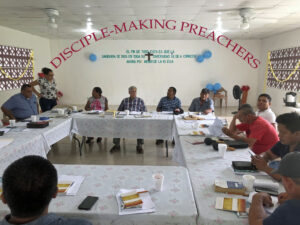
We are seeing a renewed emphasis in the church on making disciples who make disciples. The evangelical church is devoting time, money, and energy to developing resources for discipleship through conferences, workshops, books, and courses. This resurgent interest in making disciples is refreshing, given the fact that Christ left us with only one command in His great commission – make disciples of all nations (Mt. 28:19). The mission of the church is singular. All our activities should support our disciple-making mission.
THE DIVORCE
The divorce is unbiblical. Teaching/preaching is an essential element of Christ’s commission (Mt. 28:20). Paul proclaimed Christ, and he admonished people personally to present each person “complete in Christ” (Col. 1:28-29). What we do in our pulpit work should be cut from the same cloth as what we do in our personal work. Both preaching from the pulpit and preaching in person are complementary elements of disciple-making. Neglecting the work of personal discipleship is detrimental to our mission. Ignoring the work of public preaching detaches discipleship from its foundation. Without effective preaching, disciple-making is diminished. Disciple-making in person builds on and expands disciple-making by preaching. Workshops on discipleship need to include sessions on disciple-making preaching to be truly effective.
Why the great divorce?
THE SACRED/SECULAR DIVIDE
Much preaching, especially expository preaching, has sometimes stressed biblical content with limited life application. Life application in messages tends to be about individual spiritual needs or church ministry responsibilities. Sermons focus on discipling for church life while ignoring the call to disciple for whole life (Ian Hussey, “Preaching for the Whole of Life,” The Journal of the Evangelical Homiletics Society, Vol. 20, No. 1 (March 2020), 66). Mark Greene wrote in 2010, “globally 98% of Christians are neither envisioned nor equipped for mission in 95% of their waking lives” (Greene, The Great Divide, 4). He cited the example of one woman who said that she was called forward in a worship service for a prayer of dedication as a Sunday School teacher. Yet, the church did not acknowledge her role as a public school teacher despite that being her primary calling.
LACK OF WHOLE LIFE APPLICATION
If we want to integrate public preaching with personal discipleship strategies, we must hone our skills as preachers in the realm of whole-life application. Pastor Ian Hussey calls preachers to use illustrations and applications that relate to the everyday work lives of their people. We need a “faith-work integration” that engages people on the “frontlines” of life (Hussey, “Preaching for the Whole of Life”). Neil Hudson writes disciples are growing when “they have embraced their everyday contexts in such a way that they can believe that God could use them there for his purposes” (Hudson, Imagine Church, 163). Our job as preachers is to focus our sermon applications on those “everyday contexts” that people face in their careers and neighborhoods.
Disciple-making preachers show people how the biblical text relates to their working world. They challenge Christians to recognize God’s call on their lives to serve where they work and live. Preaching that makes disciples celebrates Christians who serve Christ well in the secular world, avoiding the tendency to make them feel like second-class citizens in Christ’s kingdom. Disciple-making preachers use illustrations and applications that demonstrate an understanding of the challenges people face as Christians in their careers. As preachers focus their sermon applications on frontline disciples, they lay a solid foundation for one on one discipleship during the week.
HONING OUR SKILLS IN WHOLE-LIFE APPS
The London Institute for Contemporary Christianity https://www.licc.org.uk/
The Theology of Work Bible Commentary https://www.theologyofwork.org/resources/the-theology-of-work-bible-commentary
Marketplace Chaplaincy https://mchapusa.com/
The Crocco Institute of Catalytic Leadership https://www.croccoleadership.com/


